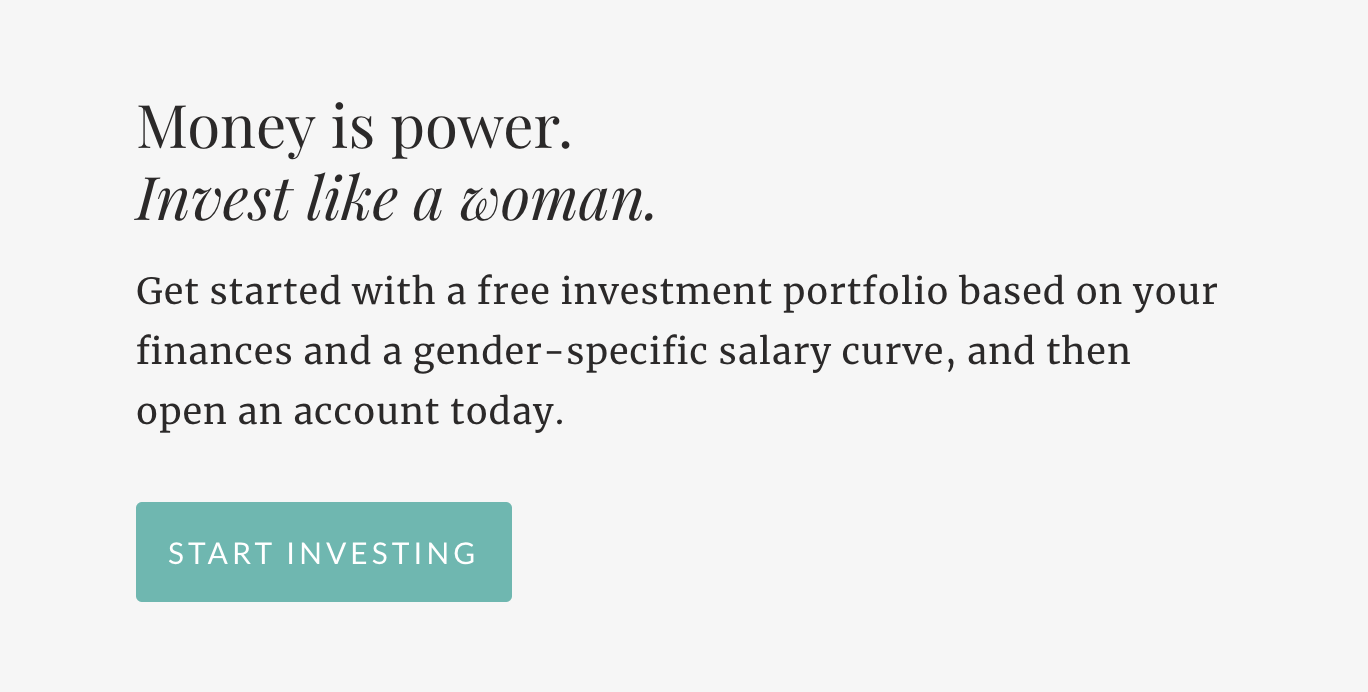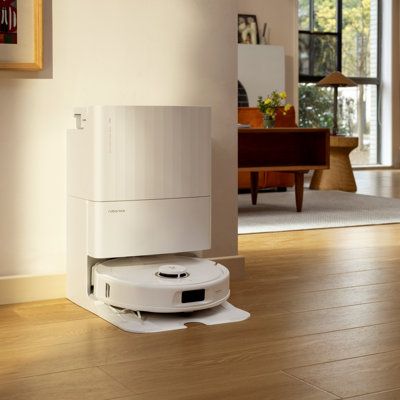Are you a yogi? Runner? Die-hard Soul Cycler, right?
Women today are healthier than ever. We know what’s best for our bodies — we know what foods we should eat and how many hours of sleep we require. And we (mostly) manage to do it. But health isn’t just about staving off the flu or getting rid of a few extra pounds — a healthy lifestyle helps us live longer, too.
Here’s the key question: If you’re taking action to live a longer, healthier life, but you’re not getting yourself financially prepared for that long life, what’s the point? If you’re preparing to live both long and well, you need to manage your money for the long-term — a.k.a. investing.
I know, I hear you: investing is kind of risky, right?
Sure, investing involves some risk. But isn’t it riskier not to invest?
When you leave your cash in a savings account, you may miss out on market gains that could be earned over time. And as an added risk: inflation will lessen your purchasing power over time. The $25,000 you saved today for retirement will likely be worth considerably less in 20 years if it’s not properly invested. Let’s say you’ve worked hard and now earn an $85,000 salary per year, and you’re saving 20% of your income in a plain old bank account. Ellevest, a digital financial advisory for women, estimates you will lose out on $1.1 million or more over the next 40 years.
If, instead, you invest that same 20% of your annual salary into a diversified investment portfolio, you have a very high probability of retiring well. Sure, there will be market fluctuations, but you may actually benefit from living longer because of the compounding returns on your investments.

Why Wellness and Wealth Go Together
There are lots of reasons why people get sick. Maybe their bodies are buckling under stress. Maybe they don’t have time for exercise or to see a doctor. Maybe they weren’t blessed with great genes. But one possible reason for poor health, which is often overlooked, is a low net worth.
We know money can’t buy happiness. Nor can it buy love, world peace or immortality. Sure, having money is great, but it isn’t the solution to every problem. What we do know, though, is that it does a decent job keeping people healthy.
There is an undeniable connection between health and wealth, and it isn’t just about having access to the best doctors. Even in nations that have universal healthcare, such as in England, the highest socioeconomic classes fare better, health-wise than the lowest socioeconomic classes. There could be any number of reasons for the discrepancy: The top socioeconomic classes may live in cleaner environments, keep more nutritious diets, have time for exercise and/or preventive medical care, and access to better schools — all of which could contribute to longer, healthier lives. And of course, another possible reason for the health gap: Financial stress.
Not only does money play a key role in where we live, the type of work we pursue, or who we marry — it can also determine how long we live or how well we live. Since women have often historically existed as financial dependents, it’s a particularly worrisome matter for us. It’s difficult to take control of your health if you don’t have control of your wealth.
One Thing You Need To Be Wealthy (Hint: It’s not rich parents.)
When you think about it physical and financial health do their own sort of compounding — when one gets better, so does the other—so why not maximize both?
In some ways, maintaining health and wealth requires a similar skill set. You need to be disciplined to stay both healthy and wealthy. Preventive medical care is expensive and inconvenient. But it’s also necessary to maintain your health. You need to know, for example, if your iron levels are low and if so, what to do about it. And you will probably want to have that suspicious mole examined or removed before it turns into melanoma. One day, our healthcare may be streamlined through artificial intelligence, but until then, we need to do our part.
Similarly, financial discipline rarely comes easily or naturally, especially when the cards are stacked against you. Some of the old rules of personal finance seem laughable in this economic environment. Conventional wisdom used to hold that college grads should only spend 30% of their salary on rent. It’s hard to imagine any major city (with real job growth) where recent grads won’t spend 50% of their salaries on rent. Still, financial discipline isn’t just about buying pinching pennies. In order to grow your wealth today, you can’t just adhere to a budget— you have to make every saved dollar work for you.
Today, fewer women are getting married or having children. And although they are outpacing men in higher education, they still get paid less and, on average, live longer than men. That means women have to get over their reluctance to take financial risks and educate themselves about investing. It’s no longer a nicety, it’s a necessity.
The Importance of Investing for Women
That’s one reason why I want to confront the issue of financial empowerment head-on in Style Salute. American women have successfully avoided candid discussions about money for decades. We go into great detail about our childbirth experiences or a great date, but credit card debt? That’s a topic that probably doesn’t come up a lot, even between the closest of girlfriends. Still, nothing will change if we don’t talk about money openly.
When we think about financial empowerment, we’re not just talking about being able to afford the trip to Tulum — no judgment if that’s your goal — more importantly, we’re talking about taking control of every facet of our lives. Because although money buys you freedom and leisure, it also helps determine your health. The first step to feeling better is to eliminate financial insecurity — that means we need to start investing now and take a more active role in managing and planning our finances.
The Bottom Line:
Although there are risks that come with investing your money, there is also the potential for rewards — namely, helping you grow your money so you can meet your financial goals faster than if you had, say, put your money away in a basic savings account. So start today, even if you put away 2% of your income into a 401(k) or an IRA. Your future self will thank you.
For when you don’t have a retirement fund…
Don’t sound the alarm – yet. Ellevest can get you set up in less than 10 minutes so you can reach all of your money goals. Sans judgment, finance jargon, and trust issues. Crisis averted. Get into it here.*

Want more? Here are a few more personal finance pieces:
How to Divvy Up Your Paycheck for Financial Success: The 50/30/20 Rule
The Personal Finance Tips Everyone In Their 20s Should Follow
3 Reasons Why You Need a Roth IRA- Even If You Have a 401(k)
Disclosures: We’re excited to be working with Ellevest to start this conversation about women and money. We receive compensation if you become an Ellevest client.
Questions? We’re here to help. Leave us a comment and we’ll get back to you!






